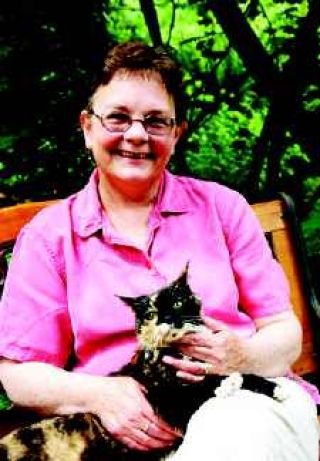As a nurse, Cathy Westerlund, 51, never figured she’d be sitting in the waiting room as a patient. But in April of 2004 she found a lump and was diagnosed with breast cancer.
For several weeks she was put through seemingly endless CAT scans, bone scans and other procedures at Overlake Hospital Medical Center.
“Those two and a half weeks are just a blur. I was constantly going to Overlake,” said Westerlund, who later tallied up 6,000 miles in hospital visits in 2004.
Westerlund works as a nurse at Angelina’s Women’s Shelter, the William Booth Men’s Respite and the Third Avenue Center – all outreach facilities through Harborview Medical Center for the homeless in Seattle.
For a while Westerlund would receive chemotherapy on Fridays and go back to work on Mondays. “The women I worked with were wonderful. My nurse manager would say, ‘You take off what you need and let me know how you’re doing.’ I’d take a week off, then work two weeks,” she said.
Then in August of 2004, Westerlund had a bilateral mastectomy, had two lymph nodes removed and had radiation for six weeks, five days a week. Westerlund suffered horrible burns from the radiation, which was probably the worst part of the whole experience for her.
“Radiation was hard … just knowing I was going to go in there again and they were going to burn it some more,” Westerlund said.
When it was finally Westerlund’s turn to sit in the waiting room as a patient, she wasn’t ready.
“I sat down and just started crying. I thought, I’m a chemo patient. I’m not used to being a patient, I’m a nurse. That was a tough one.
“During chemo, I felt awful. Nausea wasn’t a problem, but the tiredness and overall weakness … I felt like I was walking though water all the time. Walking took all the energy I had.”
Every Friday, Westerlund’s friend Twila Smith would take her to her appointment and get her a chai tea. Though now the tea repulses Westerlund due to it’s unpleasant association with chemotherapy, she hasn’t forgotten the overwhelming support of her friends through that time.
“What was really wonderful about the whole thing was the people who cared and came out,” said Westerlund, who noted her husband Tim was also very supportive, though he had a hard time accepting the meals members of the Snoqualmie Valley Alliance would bring to the door.
“It was really nice, you get kind of spoiled. It was something they could do. People want to help you and change things and they need something concrete that they can do,” Westerlund said.
At a recent check up, she was told everything was fine. Westerlund’s cancer was slow-growing and relatively isolated when discovered. She now takes the drug Femara, an aromatase inhibitor that keeps her from producing estrogen because it was estrogen that was driving the tumor. She also takes supplements, antioxidants and fish oil, eats vegetables, fruit and drinks lots of water.
Westerlund’s involvement with Relay for Life began last summer when Westerlund’s friend Sue Randall talked her into doing the survivor’s lap portion of the walk. Relay for Life is the major annual fund raiser for the American Cancer Society that takes place at sites all over the world.
“The weather was awful, but this year I decided I’d walk again.” Westerlund will be on the True Value Hardware team and plans to walk during one of the night shifts.
“It will be fun … that whole group thing with the other people who have had cancer and those with family members who have had cancer. The camaraderie will be good,” said Westerlund.
Today Westerlund is healthy and happy. She has a daughter named Cody, age 26, who stayed with her and helped her with chores during her treatment; and a grandson, Ben, age 5. Westerlund also has a stepdaughter and stepson, Erica, 19, and Adam, 16.
Westerlund’s outlook on life has also changed. Instead of putting things off, she bought the new car she’s been wanting and is visiting friends across the country she’s been promising to see.
“When I first was diagnosed, I thought I was going to die,” Westerlund said. “There were things I wanted to do – see my grandson grow up, be there for my daughter. But you hear that word cancer and think OK, this is it, but it’s not just it. Not for me. It’s a new beginning.”


